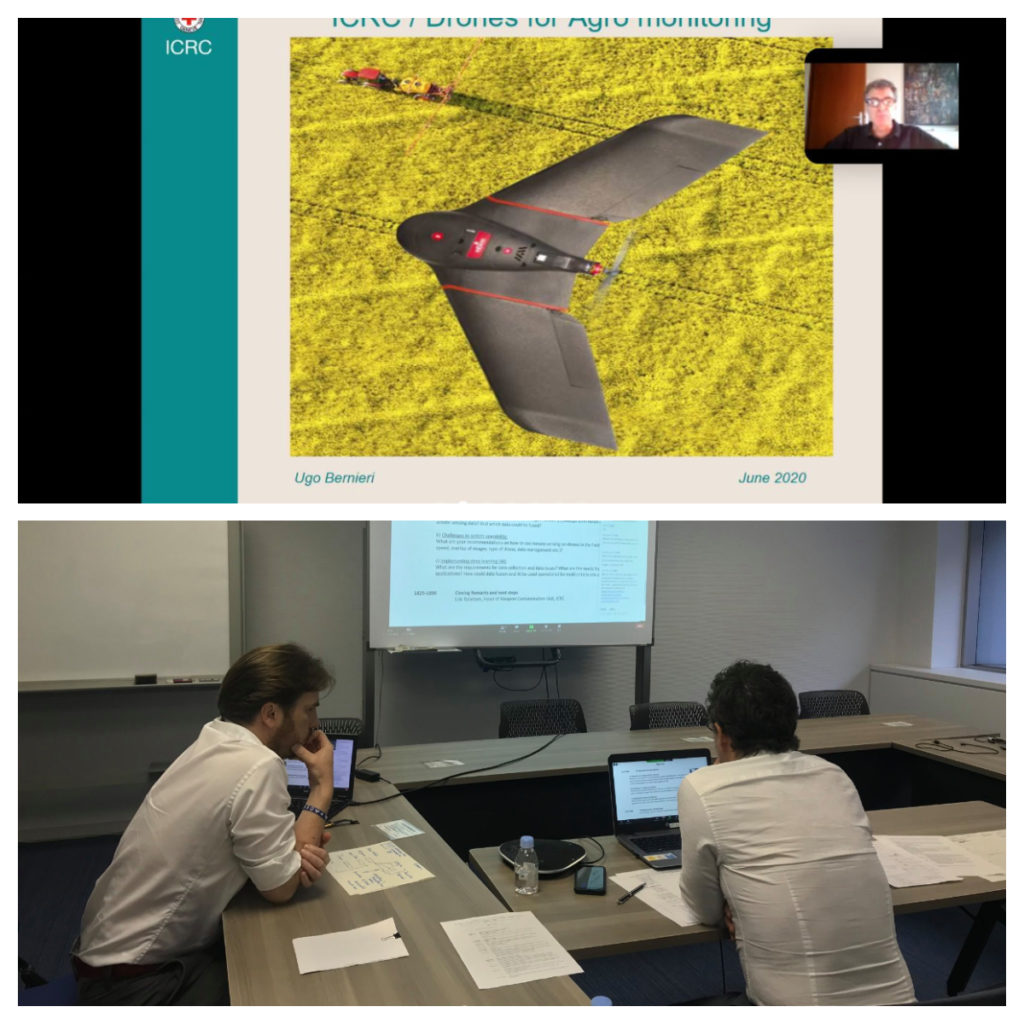イベントリポート:最先端の技術を人道支援の現場に/ Japan: Workshop on drones, remote sensing and AI for humanitarian action

©ICRC
(English text follows)
サーモカメラ搭載ドローンや遠隔センサーなどの技術を人道の現場にどう生かすかをテーマに、2020年6月4日、NEC 本社を起点にヨーロッパや日本の関係者とつないでオンラインワークショップを実施しました。赤十字国際委員会(ICRC)駐日代表部は、産学連携がカギとなるこうしたイノベーション事業を積極的に日本国内で推し進めています。
ワークショップでは、早稲田大学やNEC、Sora Technologyがそれぞれ独自の技術を発表した後、最新技術を活用するうえでどんな課題や懸念が伴うかを現場の実情・実態に基づいてICRCが提示しました。
利点として挙がったのは、(1)人の移動や避難民キャンプの広がりが把握できる、(2)地雷や不発弾が検知できる、(3)埋められた遺体の所在を突き止めることができる、(4)灌漑や収穫がモニタリングできる。一方で、懸念材料としては、精度を高めるためのディープラーニングや、データの収集・共有・保護などに議論が及びました。

不発弾探知を目的とした赤外線カメラ搭載ドローンのテスト飛行を早稲田大学と実施 ⓒICRC
NECから参加したマネージャーのベンジャミン・ブッチャー氏は、人道支援組織との連携で、自社が誇る最先端の技術に新たな価値が見出せた、と語ります。「世界で弱い立場に置かれている人々に手を差し伸べるICRCと連携することで、自分たちの技術の適用についてこれまでにない視点でとらえ、人々を助けるための道を開くことに意義を感じます。ICRCは倫理面での責任感も強く、民間企業と連携しながらも独立性を保つための明白なガイドラインがあります。その指針を踏まえて産学連携の可能性を探るといった、とてもオープンな関係が築けています」。
ICRCで武器汚染関連ユニットを率いるエリック・トレフセンは「できることは山ほどあるので、それぞれの知恵を持ち寄って、互いを高めつつ成果につなげたい」とし、3時間近くにわたったワークショップを締めくくりました。また、外務省国際協力局の桑原進審議官は「産官学がともに議論することによって、日本の技術が活用され、きちんと結果を出すことが大事。日本政府も、人道ニーズを満たすためのイノベーションを歓迎している」と語りました。今後のプロジェクトの進展と、日本の貢献に期待が高まります。
The International Committee of the Red Cross (ICRC), NEC Corporation and Waseda University, Japan, co-hosted an online workshop on the use of drones, remote sensing and artificial intelligence (AI) to improve the way humanitarian workers respond to disasters, conflict and other violence. More than 35 participants, representing humanitarian organizations, academia, private sector and the government, attended the workshop that was held on June 4, 2020. The workshop aimed at sharing the progress of the project working to respond to humanitarian challenges with innovative tools and defining how airborne thermal and remote sensing data and deep learning could be used in diverse situations to survey large areas of land, monitor changes on ground and other humanitarian needs. Their low environmental footprint could also promote sustainable development in line with the recommendations of the United Nations’ Sustainable Development Goals and the Sendai Framework for Disaster Risk Reduction (2015-2030).
Participants presented several case studies elaborating how innovative techniques could be used in humanitarian aid. For instance, they spoke about the collaboration between the ICRC and Waseda University to develop airborne thermal sensing that detects weapons and landmines. Other examples shared included medicines being delivered using drones, investigating issues in underground construction and pipelines, monitoring movement and growth of refugees and internally displaced people, assessing damage after disasters and surveying mass burial sites and mortal remains.
They also discussed various challenges including the diverse conditions in which the ICRC would use these methods, how that may impact the results and how much humanitarian organizations will be able to rely on the full potential of drone technology.

The ICRC and Waseda University tested a drone with thermos sensor cameras to identify explosive remnants of war ⓒICRC
Mr Erik Tollefsen, who heads the ICRC’s team of ordnance disposal experts, shared that while there is a need for improved database structures, it is crucial that the collected data is protected from abuse. “We can train the machine to recognize patterns, improve the probability of detection and reduce the rate of triggering false alarms. But for the ICRC to be credible while communicating with different parties in the context of war and conflict, accuracy and moral responsibility in data collection would be the key to the project’s success,” he said.
Officials of the Ministry of Foreign Affairs in Japan and Waseda University said this workshop could be a step forward in strengthening ties with the Japanese commercial sector. Mr Benjamin Butcher, Manager of NEC Corporation, said, “Working with the ICRC and helping vulnerable people while maintaining the highest ethical standards gives us unique perspectives on the application of our technology, opening up new ways to help people and create value. The ICRC has clear guidelines on how they work with private companies to ensure independence. The clarity of roles and boundaries allows us to have a very open relationship, learning from one another across the industrial, academic and humanitarian domains.”
He added that Japan has historically played a big role in providing many countries with assistance to solve social challenges. “NEC constantly supplies cutting-edge innovation on challenging humanitarian projects. I believe that the best place to deliver the benefits of innovation is from Japan with close partners like the ICRC,” said Mr Butcher.

